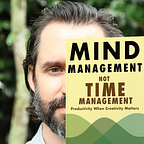Sleep is work
After sleeping on it a couple of times, one portion of my recent Love Your Work podcast interview with neuroscientist John Kounios sticks out.
“Sleep is NOT doing nothing. Sleep is mental work. Sleep is creative work. Your brain is churning over memories, it’s clearing out the mental cobwebs — it’s generating ideas. Sleep is itself work. So if a person’s trying to solve a problem, and they take a nap to sleep on it, that’s not NOT working on the problem, that IS working on the problem.”
Dr. Kounios explains that when you sleep, your brain is doing “memory consolidation.” It’s taking information from the previous day that’s temporarily stored in the hippocampus, and consolidating it into a more retrievable form. Hidden or non-obvious associations are start to become clear.
“That’s why often people wake up in the middle of the night with an idea, or they have that idea as soon as they wake up in the morning, before they’re even fully awake.”
For example, imagine I tell you that Tom is taller than Harry, and Harry is taller than Jack, then you take a nap.
When you wake up, I ask you, “Who is taller, Tom, or Jack?” Because you took that nap, you’ll be quicker to answer the question than if you hadn’t taken that nap.
I didn’t tell you that Tom was taller than Jack. It was implicit in the information I gave you. Your brain had to make the association, and though this isn’t a particularly difficult logical problem, you were better-equipped to solve it because your brain had slept on it.
So, one of many reasons to not skimp on sleep. While I’m at it, here are some quick things I do to make sure I get good sleep:
- No screens 2 hours before bedtime. This isn’t the easiest thing to do, so I at the very least wear special dorktastic glasses that block out the blue light.
- Sleep with earplugs and a mask. I hate foam earplugs, so I use these silicone ones. I’ve tried enough masks to be a mask aficionado, and the best ones I’ve found are at Walgreen’s, mold around your nose, and have little “cups” that allow your eyelids to move while you sleep (which purportedly will not disrupt your REM sleep).
- Make sure your chemicals are in order. Nutrition and hormones are important to sleep. I’m not even close to a doctor, so none of this is advice, but I’ve personally had success with applying magnesium oil (which absorbs well through the skin without upsetting your stomach), or taking 3 grams of Glycine before bed. (What works for me changes from time to time, but when I hit the right thing, it works wonders. Your best bet is to get a full nutritional panel to spot the deficiencies.)
Listen to the full interview of Dr. Kounios on Love Your Work to learn more about how to encourage creative insights in your brain.
Did you get THIS FAR!? ♥’s are appreciated and get me writing more. –David
